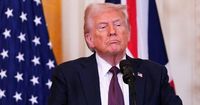In a dramatic turn of events, President Donald Trump declared a national emergency on April 2, 2025, in a bid to bolster the United States' competitive edge and protect its economic sovereignty. This announcement, made during a press briefing at the White House, comes in response to what Trump described as a national emergency caused by foreign trade practices that have weakened the U.S. manufacturing base and created a significant trade deficit.
According to the White House, Trump's reciprocal tariff order aims to consolidate the economic position of the United States and protect American workers. He believes that the persistent annual goods trade deficits have not only undermined domestic production capabilities but have also made the national defense industrial base reliant on foreign adversaries.
"The trade deficit is a serious issue that we must address immediately," Trump stated. He cited the International Emergency Economic Powers Act of 1977 (IEEPA) as the legal basis for his actions, emphasizing the need to rectify the ongoing trade imbalance. As part of this emergency declaration, the Trump administration plans to impose a 10% tax on imports from every country and territory around the globe, effective April 5, 2025.
Moreover, higher reciprocal taxes will be levied on nations that maintain large trade surpluses with the U.S. These taxes will amount to half of the tariffs those countries impose on American goods. The new tariffs will remain in place until Trump deems that the threat posed by trade deficits or unfair treatment has been mitigated.
Some goods, however, will be exempt from these reciprocal tariffs, including essential items such as aluminum, steel, automobiles, pharmaceuticals, and semiconductors. For Canada and Mexico, existing IEEPA orders concerning fentanyl and immigration will remain unaffected by this new tariff regime. Goods covered under the U.S.-Mexico-Canada Trade Agreement (USMCA) will continue to enjoy a 0% tax rate, while those not included in the agreement will face a 25% tax.
In 2024, the U.S. trade deficit reached a staggering $1.2 trillion, prompting economists to express concerns about the sustainability of such a financial trajectory. While many experts agree that the goods trade deficit does not encapsulate the entire narrative of U.S. economic interactions with its trading partners, Trump's administration is adamant about taking decisive action.
As news of the tariffs broke, reactions poured in from various sectors. Some analysts argue that Trump's approach could lead to a significant downturn in the economy. A report from Goldman Sachs suggested that the probability of a recession could soar to 35%, with inflation and consumer confidence already showing signs of distress not seen since 2008. The financial community is particularly worried about the potential for rising car prices, which could increase by anywhere from $2,000 to $15,000 due to the new tariffs.
On the international front, Trump's tariffs are being referred to as a "Liberation Day" for the U.S., aimed at freeing the nation from what he perceives as exploitation by trading partners. However, this move has raised eyebrows globally, as it disrupts established trade relations and could lead to retaliatory measures from affected countries. The so-called "Dirty 15"—a term coined to describe the countries with which the U.S. has the largest trade deficits—includes nations like the European Union, China, and Vietnam, with tariffs on Vietnam reaching up to 46% and 34% on China.
While Trump maintains that these tariffs are necessary to restore balance and protect American jobs, critics point to the historical failures of similar policies. For instance, during his first term, the imposition of steel tariffs resulted in job losses in industries reliant on that material, with a net loss of 75,000 jobs for every 1,000 jobs created in steel production.
Moreover, Trump's advisors, including Peter Navarro, project that these tariffs could generate $600 billion annually for the U.S. Treasury. However, the long-term implications of such a strategy remain uncertain, with some experts warning that it may undermine the United States' leadership position in the global economy.
As the world watches closely, the financial markets are reacting to the news with caution. The Federal Reserve Chairman Jerome Powell, in a recent speech, expressed concerns about the potential instability and inflationary pressures that could arise from these tariffs, reiterating the need for a balanced approach to trade policy.
In a related development, the political landscape in France has also been shaken by the conviction of far-right leader Marine Le Pen, which has temporarily halted her presidential ambitions. This event coincides with Trump's announcement, as both leaders navigate their respective political challenges amid economic turmoil.
As Trump pushes forward with his aggressive trade policies, the question remains: will these tariffs indeed protect American jobs and restore the manufacturing base, or will they lead to a greater economic downturn and increased tensions with global trading partners? Only time will tell how this bold strategy will unfold, but one thing is clear: the stakes are high, and the implications are far-reaching.




